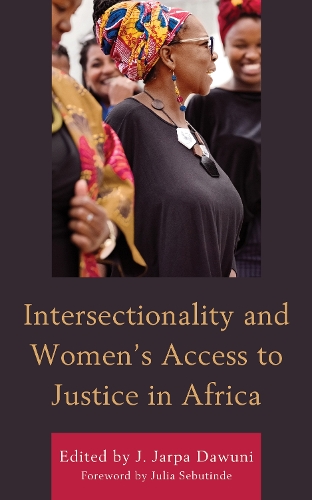
Intersectionality and Womens Access to Justice in Africa
(Hardback)
Publishing Details
Intersectionality and Womens Access to Justice in Africa
By (Author) J. Jarpa Dawuni
Foreword by Julia Sebutinde
Contributions by Maame Efua Addadzi-Koom
Contributions by Michael Addaney
Contributions by Rebecca Emiene Badejogbin
Contributions by Samia Bourouba
Contributions by J. Jarpa Dawuni
Contributions by Jeremie Diye
Contributions by Vera Duarte
Contributions by Eghosa O. Ekhator
Bloomsbury Publishing PLC
Lexington Books
28th October 2022
United States
Classifications
Professional and Scholarly
Non Fiction
Legal systems: courts and procedures
Gender studies, gender groups
346.6013082
Physical Properties
Hardback
440
Width 158mm, Height 237mm, Spine 31mm
767g
Description
Intersectionality and Women's Access to Justice, edited by J. Jarpa Dawuni, propounds layered intersectionality as a paradigm for examining how gendered factors affect women's access to justice, whether as judges or litigants. Through intersectional and decolonial frameworks, the contributors analyze the lived experiences of women and their access to justice by situating the courtroom as both a spatial and a temporal arena for seeking justice (as litigants) and for seeking access to the bench (as judges). This book examines patterns of mutually reinforcing discriminatory practices that women share based on common gender identities and depending on which identities are at play at a given point in time in both traditional and statutory courts. The book provides recommendations for various justice sector providers.
Reviews
"A truly significant publication that engages with critical questions of how intersectional categories impede women's access to justice in Africa. The book is timely, coming at a point when women in Africa are increasingly taking up leading positions in society and interacting extensively with the law, not only as litigants but also as members and leaders of the judiciary, an all-important institution. This work is a must-read for the judiciary, advocates for women's access to justice, and the legal profession as a whole."
--Yvonne Mokgoro, Former Justice of the Constitutional Court, Republic of South Africa"This book explores women's access to the justice system as judges and as litigants. This is a pioneering work that looks at women as insiders and as outsiders in the justice system. It shows that irrespective of their positionality as insiders or outsiders, women face intersecting challenges in their efforts to navigate and access justice systems. This book departs from the common essentialist portrayal of women as a monolithic group. It recognizes the fact women in any category and within each category, face intersecting layers of simultaneous privilege and discrimination. This is a rich, thoughtful, and diverse compendium of chapters examining a multiplicity of core issues at the center of gender equality and access to justice. It is an instructive and rich comparative study of gender in the justice system. This is an important and immensely valuable book."
--Muna Ndulo, William Nelson Cromwell Professor of International and Comparative Law at Cornell Law School"This book sums up the impediments women face in accessing justice by cleverly adopting an intersectional approach that combines historical and empirical analyses to weave a narrative that is both compelling and theoretically grounded. In yet another novel research output, J. Jarpa Dawuni has crafted a masterpiece that contributes to our knowledge about women and law across Africa. By traversing different countries, legal systems and traditions, Intersectionality and Women's Access to Justice in Africa is an important resource for lawyers, judicial officers, political leaders, policy makers, and women's rights advocates. A useful resource for advocacy on women's rights and women's representation in law."
--Florence N. M. Mumba, International Judge, Supreme Court Chamber, ECCCAuthor Bio
J. Jarpa Dawuni is associate professor of political science at Howard University.
